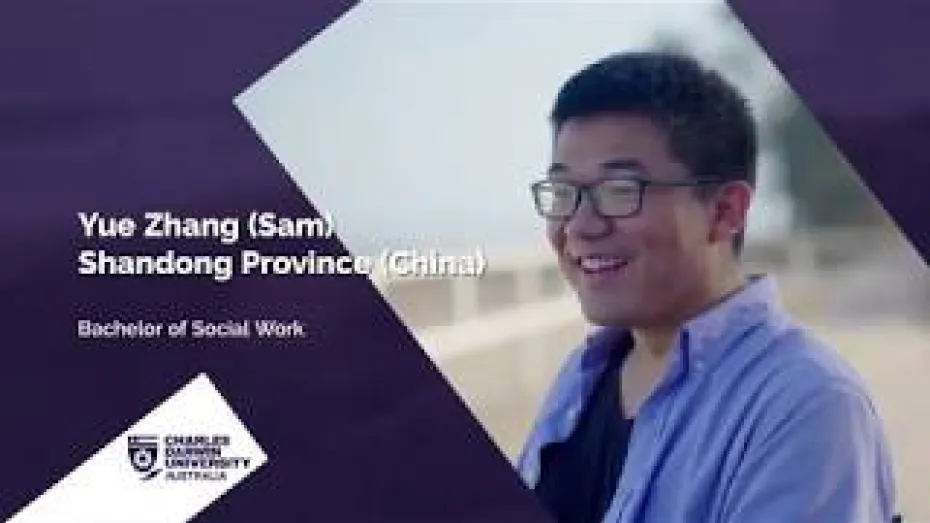Key details
Duration
Intake
Locations
Entry requirements
View full entry requirementsCredit points required
320Course code
Overview
The Bachelor of Social Work is a professionally recognised degree that prepares you to pursue a career as a social worker, working with people to enhance their wellbeing. As a social worker you will use principles of social justice, human rights and cultural safety to promote social change and empowerment by providing a range of skills in counselling, case management and community development.
The course incorporates knowledge from social work, psychology, social policy, research and First Nations Peoples perspectives. With the Bachelor of Social Work, you will gain the knowledge and practical skills required to work with individuals, families, groups and communities in a safe and inclusive way with those in crisis, or impacted by poverty and social disadvantage.
The course includes 20 days of face-to-face classes delivered in five-day intensive blocks, prior to placements. This requirement for completion of the degree meets the professional accreditation standards of the Australian Association of Social Workers (AASW).
Note: any travel and accommodation related expenses required to attend the intensives and placements are at the students expense.
Career opportunities
Career opportunities for graduates from this course include child protection, counselling, youth work, community development, policy, hospital and primary health, mental health, women-s and men-s
services, housing, faith-based services, addiction services, private practice, schools, aged care, corrections and on Country.
Practical experience
This course includes 1000 hours of supervised field placements.
Professional recognition
Graduates of the Bachelor of Social Work are eligible for membership to the Australian Association of Social Workers (AASW).
Credit transfers and advanced standing
Pathways
Pathways for VET to Higher Education
Credit transfer arrangements are available to students commencing a bachelor degree at Charles Darwin University with completed Certificate IV, Diploma, Advanced Diploma or Associate Degree qualifications in the same field or discipline, subject to meeting criteria. Students who hold completed qualifications should refer to the additional information provided about Advanced Standing and Credit Transfer and Pathways using the links below:
Pathways for Higher Education to Higher Education
For information about credit transfer available to students with complete or incomplete study at this or other Institutions refer to Pathways for Higher Education to Higher Education
Credit transfer
For further information on credit transfer and how to apply visit ASK CDU
Credit transfers and advanced standing
Credit transfer
For further information on credit transfer and how to apply visit ASK CDU
Fees
Commonwealth supported places
Commonwealth Supported places are available in this course to students who meet one of the following residency requirements:
(a) be an Australian citizen, who will complete some of your course of study while resident in Australia; or
(b) a New Zealand citizen; or an Australian permanent visa holder; or an eligible former permanent humanitarian visa holder; who studies the entire course while living in Australia.
Further information about fees and charges can be found at Fees and Payments.
International tuition fees
The annual tuition fee for full time study in 2026 is AUD $31,784.00. This equates to $3,973.00 per 10 credit point unit (0.125 EFTSL).
These fees are subject to increases annually, effective at the start of each calendar year.
You can find a list of International fees and payments you can expect to pay as part of your studies in Australia. See 2026 Higher Education International Annual Tuition Fees.
CDU offers a number of scholarships to international students to assist with the cost of study.

Why study social work at CDU?
Study Social Work with us and make a real difference to local communities, families and individuals, or in the humanitarian aid industry abroad. You'll gain knowledge and skills through placements, intensive units and theoretical knowledge, and graduate as a culturally competent specialist ready to create change.
- #4 Australian university for graduate employment outcomes (GUG 2023)
- #3 in Australia for social work starting salaries (GUG 2023)
- Flexibility and support to study full-time or part-time, on campus or online

Why study social work at CDU?
Study Social Work with us and make a real difference to local communities, families and individuals, or in the humanitarian aid industry abroad. You'll gain knowledge and skills through placements, intensive units and theoretical knowledge, and graduate as a culturally competent specialist ready to create change.
- #4 Australian university for undergraduate employment outcomes (GUG 2023)
- #3 in Australia for social work starting salaries (GUG 2023)

Why study social work at CDU?
Study Social Work with us and make a real difference to local communities, families and individuals, or in the humanitarian aid industry abroad. You'll gain knowledge and skills through placements, intensive units and theoretical knowledge, and graduate as a culturally competent specialist ready to create change.
- #4 Australian university for graduate employment outcomes (GUG 2023)
- #3 in Australia for social work starting salaries (GUG 2023)
- Flexibility and support to study full-time or part-time, on campus or online

Why study social work at CDU?
Study Social Work with us and make a real difference to local communities, families and individuals, or in the humanitarian aid industry abroad. You'll gain knowledge and skills through placements, intensive units and theoretical knowledge, and graduate as a culturally competent specialist ready to create change.
- #4 Australian university for undergraduate employment outcomes (GUG 2023)
- #3 in Australia for social work starting salaries (GUG 2023)
What will I study?
The course requires 4 years of full-time study (or equivalent part-time) and is offered both internally and online with requirement to come on campus at least once per year. Direct practice includes working with individual, groups, communities, in remote and regional settings within a range of contexts including government, not for profit, private and on country. The course consist of 26 Core unit and two general elective units.
Course structure
A candidate must successfully complete units totalling 320 credit points (cp) as detailed below. All units are valued at 10 credit points unless otherwise indicated.
| Unit type | Credit Points | Specific requirements |
| Core Units (26 units) | 300cp | Compulsory Core units totalling 300 credit points as per the list of units detailed below. HSC133 Perspectives of First Nations Health (title change 2026) PSY150 Introduction to Psychology A SWK101 Introduction to Human Services SWK102 Communication Skills SWK103 Social Work Skills A (includes compulsory 5-day intensive) # SWK104 Professional Foundations of Social Work IAS222 Global Sociology IAS245 Indigenous Contemporary Perspectives PSY203 Developmental Psychology Across the Lifespan SWK201 Human Service Organisations SWK202 Dynamics of Group Work SWK203 Social Work Skills B (includes compulsory 5-day intensive) # SWK230 Field Education A (30 credit points) ## SWK301 Working with and Developing Communities SWK302 Social Work Theory and Practice (includes compulsory 5-day intensive) # SWK311 Social Policy SWK312 Social Research Methods SWK313 Engaging with Individuals and Families in Partnership SWK314 Ethics Rights and Social Justice SWK315 Social Work Practice in Mental Health SWK316 Building Safe Communities (previously SWK401) SWK317 Dynamics of Loss and Grief (previously SWK404) SWK318 Skills for Regional and Remote Practice (previously SWK405) SWK323 Legal Issues in Social Work (previously SWK403) SWK402 Integrated Methods in Social Work (includes compulsory 5-day intensive) # SWK470 Field Education B (30 credit points) ## |
| Electives (2 unit) | 20cp | Elective units totalling 20 credit points selected from undergraduate units offered by the University |
| 320cp | Total Credit Points |
Course Rules (unless otherwise indicated in the above course structure) (320cp)
- A maximum of 120 credit points may be taken from 100 level units.
- A minimum of 80 credit points must be taken from 300 level units or above.
- See the Higher Education Course Rules (Award Requirements) in the Units and Courses Policy.
# Intensive block: Students are required to attend a 5 day on-campus intensive block as a part of this unit.
## Work Integrated Learning: Students are required to attend the placement hours as allocated by CDU Placement Office.
Study plan
STUDENTS COMMENCING IN SEMESTER 1
The Recommended Study Plan provided below is suitable for a student enrolling in a full-time study load. Students entering this course with advanced standing, or wishing to vary their study plan due to work, personal, financial or other reasons should use the table as a guide to create an individual study plan.
When designing an individual study plan:
- maintain the basic order in which units are to be attempted; and
- check the prerequisite and assumed knowledge for each unit as some units assume you have completed foundation unit/s in the unit area at a lower level.
| Legend: | CO = Core Unit | E = General Elective |
Note: All students are required to attend compulsory intensive workshops.
Full-Time Study Plan
| Semester 1 | Semester 2 | ||
| Year 1 | |||
| HSC133 Perspectives of First Nations Health (title change 2026) | CO | IAS222 Global Sociology | CO |
| PSY150 Introduction to Psychology A | CO | SWK102 Communication Skills | CO |
| SWK101 Introduction to Human Services | CO | SWK103 Social Work Skills A (contains 5-day compulsory intensive) # | CO |
| SWK104 Professional Foundations of Social Work | CO | SWK201 Human Service Organisations | CO |
| Year 2 | |||
| IAS245 Indigenous Contemporary Perspectives | CO | PSY203 Developmental Psychology | CO |
| SWK202 Dynamics of Group Work | CO | SWK302 Social Work Theory and Practice (contains 5-day compulsory intensive) # | CO |
| SWK203 Social Work Skills B (contains 5-day compulsory intensive) # | CO | SWK311 Social Policy | CO |
| SWK301 Working with and Developing Communities | CO | General Elective 1 | E |
| Year 3 | |||
| SWK312 Social Research Methods | CO | SWK313 Engaging with Individuals and Families in Partnership | CO |
| SWK230 Field Education A (30cp) ## | CO | SWK314 Ethics, Rights and Social Justice | CO |
| SWK315 Social Work Practice in Mental Health | CO | ||
| SWK323 Legal Issues and Social Work | CO | ||
| Year 4 | |||
| SWK316 Building Safe Communities | CO | SWK318 Skills for Regional and Remote Practice | CO |
| SWK317 Dynamics of Loss and Grief | CO | SWK470 Field Education B (30cp) ## | CO |
| SWK402 Integrated Methods in Social Work (contains 5-day compulsory intensive) # | CO | CO | |
| General Elective 2 | E | E | |
# Intensive block: Students are required to attend a 5 day on-campus intensive block as a part of this unit.
## Work Integrated Learning: Students are required to attend the placement hours as allocated by CDU Placement Office.
Top of Page
_____________________________________
STUDENTS COMMENCING IN SEMESTER 2
The Recommended Study Plan provided below is suitable for a student enrolling in a full-time study load. Students entering this course with advanced standing, or wishing to vary their study plan due to work, personal, financial or other reasons should use the table as a guide to create an individual study plan.
When designing an individual study plan:
- maintain the basic order in which units are to be attempted; and
- check the prerequisite and assumed knowledge for each unit as some units assume you have completed foundation unit/s in the unit area at a lower level.
| Legend: | CO = Core Unit | E = General Elective |
Note: All students are required to attend compulsory intensive workshops.
Full-Time Study Plan
| Semester 1 | Semester 2 | ||
| Year 1 | |||
| IAS222 Global Sociology | CO | ||
| SWK101 Introduction to Human Services | CO | ||
| SWK102 Communication Skills | CO | ||
| SWK201 Human Service Organisations | CO | ||
| Year 2 | |||
| HSC133 Perspectives of First Nations Health (title change 2026) | SWK103 Social Work Skills A (contains 5-day compulsory intensive) # | CO | |
| PSY150 Introduction to Psychology A | CO | PSY203 Developmental Psychology | CO |
| SWK104 Professional Foundations of Social Work | CO | SWK311 Social Policy | CO |
| SWK202 Dynamics of Group Work | CO | General Elective 1 | E |
| Year 3 | |||
| IAS245 Indigenous Contemporary Perspectives | CO | SWK302 Social Work Theory and Practice (contains 5-day compulsory intensive) # | CO |
| SWK203 Social Work Skills B (contains 5-day compulsory intensive) # | CO | SWK313 Engaging with Individuals and Families in Partnership | CO |
| SWK301 Working with and Developing Communities | CO | SWK315 Mental Health Social Work | CO |
| General Elective 2 | E | SWK323 Legal Issues in Social Work | CO |
| Year 4 | |||
| SWK312 Social Research Methods | CO | SWK314 Ethics, Rights and Social Justice | CO |
| SWK230 Field Education A (30cp) ## | CO | SWK317 Dynamics of Loss and Grief | CO |
| SWK318 Skills for Regional and Remote Practice | CO | ||
| SWK402 Integrated Methods in Social Work (contains 5-day compulsory intensive) # | E | ||
| Year 5 | |||
| SWK316 Building Safe Communities | CO | ||
| SWK470 Field Education B (30cp) ## | CO | ||
# Intensive block: Students are required to attend a 5 day on-campus intensive block as a part of this unit.
## Work Integrated Learning: Students are required to attend the placement hours as allocated by CDU Placement Office.
Top of Page
____________________________________________
STUDENTS COMMENCING IN SUMMER SEMESTER
The Recommended Study Plan provided below is suitable for a student enrolling in a full-time study load. Students entering this course with advanced standing, or wishing to vary their study plan due to work, personal, financial or other reasons should use the table as a guide to create an individual study plan.
When designing an individual study plan:
- maintain the basic order in which units are to be attempted; and
- check the prerequisite and assumed knowledge for each unit as some units assume you have completed foundation unit/s in the unit area at a lower level.
| Legend: | CO = Core Unit | E = General Elective |
Note: All students are required to attend compulsory intensive workshops.
Full-Time Study Plan
| Semester 1 | Semester 2 | Summer Semester | |||
| Year 1 | |||||
| PSY150 Introduction to Psychology A | CO | ||||
| SWK101 Introduction to Human Services | CO | ||||
| SWK102 Communication Skills | CO | ||||
| SWK201 Human Service Organisations | CO | ||||
| Year 2 | |||||
| HSC133 Perspectives of First Nations Health (title change 2026) | CO | IAS222 Global Sociology | CO | ||
| SWK104 Professional Foundations of Social Work | CO | PSY203 Developmental Psychology | CO | ||
| SWK202 Dynamics of Group Work | CO | SWK103 Social Work Skills A (contains 5-day compulsory intensive) # | CO | ||
| General Elective 1 | E | SWK311 Social Policy | CO | ||
| Year 3 | |||||
| IAS245 Indigenous Contemporary Perspectives | CO | SWK302 Social Work Theory and Practice (contains 5-day compulsory intensive) # | CO | ||
| SWK203 Social Work Skills B (contains 5-day compulsory intensive) # | CO | SWK313 Engaging with Individuals and Families in Partnership | CO | ||
| SWK301 Working with and Developing Communities | CO | SWK315 Mental Health Social Work | CO | ||
| General Elective 2 | E | SWK323 Legal Issues in Social Work | CO | ||
| Year 4 | |||||
| SWK312 Social Research Methods | CO | SWK314 Ethics, Rights and Social Justice | CO | ||
| SWK230 Field Education A (30cp) ## | CO | SWK317 Dynamics of Loss and Grief | CO | ||
| SWK318 Skills for Regional and Remote Practice | CO | ||||
| SWK402 Integrated Methods in Social Work (contains 5-day compulsory intensive) # | E | ||||
| Year 5 | |||||
| SWK316 Building Safe Communities | CO | ||||
| SWK470 Field Education B (30cp) ## | CO | ||||
# Intensive block: Students are required to attend a 5 day on-campus intensive block as a part of this unit.
## Work Integrated Learning: Students are required to attend the placement hours as allocated by CDU Placement Office.
Top of Page
Entry requirements
Admission criteria
Admission requirements are met by one of the following:
- Successful completion of the Northern Territory Certificate of Education and Training (or equivalent) and the awarding of an Australian Tertiary Admissions Rank (ATAR) of at least 60*.
- Successful completion of a national qualification at Certificate III level or higher.
- Successful completion of at least 0.5 year of full-time study (or equivalent) of a higher education degree/diploma.
- Overseas secondary or tertiary qualifications considered equivalent to the above Australian qualifications.
- Attainment of a STAT Multiple Choice score of 140.
- Successful completion of the Tertiary Enabling Program, the Preparation for Tertiary Success courses, or other recognised tertiary preparation course.
- Submission of an acceptable personal competencies statement and/or employment experience.
- Australian Defence Force (ADF) members with service of 1 year or more at the following ranks (or higher) meet the academic entry requirement for this course:
- Navy: Seaman, Able Seaman, Leading Seaman
- Air Force: Aircraftmen/Aircraftwoman, Leading Aircraftman/Aircraftwoman, Corporal
- Army: Private, Lance Corporal, Corporal
- Current School Leaver Pathways:
- Best of 3 Year 12 subject grades
- School recommendation program
* After any applicable adjustment factors have been applied.
Essential requirements
English language requirements
DOMESTIC STUDENTS
To gain entry into Charles Darwin University, all Higher Education applicants must satisfy the University's English Language Proficiency Requirements for their chosen course of study. All applicants will be required to supply evidence of this at the time of application.
The minimum English language requirement for this course can be met by evidencing of one of the following:
| Year 12 | Successful completion of Year 12 within Australia, or an equivalent qualification from an approved country where English is the official language (refer to our approved standard and extended lists included below). |
| 0.5 FTE Higher Education Study | Successful completion of at least 0.5FTE of higher education study from Australia or an approved country where English is the official language (refer to our approved standard and extended lists included below). If studies were completed from a country on the extended list, they must have been completed within the past five (5) years. |
| CDU Enabling Course | Successful completion of a Charles Darwin University enabling program of at least 0.5FTE (40 credit points). |
| TAFE Qualification | Successful completion of a recognised TAFE qualification at a Certificate III level or higher from Australia. |
| AHPRA Registration | Current AHPRA registration as a Division 1 or Division 2 nurse. Registration must be current at the time of course commencement. |
| English Test^ | Completion of an approved English test within two years of commencement, meeting the minimum scores outlined in the table below. |
^ Minimum Requirements for English Tests:
| Postgraduate requirements | Undergraduate requirements | |
| CDU ELICOS - English for Academic Purposes | Successful completion of EAP004 | Successful completion of EAP003 |
| International English Language Testing System (IELTS) Academic test | Overall minimum: 6.5 No band below: 6.0 | Overall minimum: 6.0 No band below 6.0 |
| Cambridge English: Advanced (CAE) | Overall minimum: 176 No skill below: 169 | Overall minimum: 169 No skill below 169 |
| Pearson Tests of English (PTE) Academic | Overall minimum: 58 No score below 50 | Overall minimum: 50 No score below: 50 |
| Test of English as a Foreign language | Overall minimum: 79 Minimum writing score: 21 | Overall minimum: 60 Minimum writing score: 21 |
IELTS One Skill Retake is accepted, allowing candidates to retake a single skill within 60 days of sitting their initial test. One Skill Retake results are valid for two years from the date of the first test (not from the date of the Retake test) to the date of commencement at CDU.
CDU accepts combined results from two test sittings of IELTS Academic, PTE Academic, or TOEFL, taken within a six-month period, if:
- Both tests were under the same testing system; and
- The overall score in both tests meets the overall minimum; and
- The applicant achieved the section minimum for each section in at least one test.
Recognised English-speaking countries:
| Standard List | Antigua and Barbuda, Australia, Barbados, British Virgin Islands, Canada, Ireland, New Zealand, Singapore, South Africa, United Kingdom, United States of America. |
| Extended List | Bermuda, Botswana, Cayman Islands, Ethiopia, Fiji, Kenya, Malawi, Malta, Mauritius, Seychelles, St Vincent and the Grenadines, Tanzania, Trinidad and Tobago, Vanuatu, Zimbabwe. |
For further details on the English requirements for CDU courses, please refer to the CDU English Language Proficiency Policy.
INTERNATIONAL STUDENTS
To gain entry into Charles Darwin University, all Higher Education applicants must satisfy the University's English Language Proficiency Requirements for their chosen course of study.
The minimum English language requirement for this course is met by undertaking one of the following English language tests and obtaining the minimum requirements listed below.
| IELTS Academic Module | A minimum overall score of 7.0 with no score below a 7.0 in reading, writing, speaking and listening skills. |
| Cambridge Advanced English (CAE) | Test not accepted for this course. |
| Common European Framework Certificate of English Proficiency | Test not accepted for this course. |
| Pearson Test of English (PTE) Academic module | A minimum overall score of 65 with no score less than 65 in reading, writing, speaking and listening. |
| TOEFL Internet-based Test (iBT) | A minimum overall score of 94 with a minimum score of 24 in reading and listening, a minimum score of 27 in writing and a minimum score of 23 in speaking. |
* All tests are valid for two years from the date of the test to the date of commencement at CDU, unless otherwise specified.
* Where applicable, international applicants must also satisfy the Department of Home Affairs (DHA) English language requirements for student visa applications.
Do you have a question regarding English requirements at CDU? Please email: international@cdu.edu.au.
ATAR profile
The following table represents the ATAR and selection rank profile for applicants offered a place on the basis of their ATAR in semester 1, 2025
| ATAR based offers only | ATAR (excluding adjustment factors) | Selection Rank (ATAR plus any adjustment factors) |
|---|---|---|
| Lowest rank to receive an offer | <5 | <5 |
| Median rank to receive an offer | <5 | <5 |
| Highest rank to receive an offer | <5 | <5 |
Notes
"<5" indicates less than 5 ATAR-based offers were made.
CDU brings social work to life. The lecturers are experts from various sectors of social work practice.
Chigozie
CDU Student

CDU brings social work to life. The lecturers are experts from various sectors of social work practice.
Chigozie
CDU student

CDU brings social work to life. The lecturers are experts from various sectors of social work practice.
Chigozie
CDU Student

CDU brings social work to life. The lecturers are experts from various sectors of social work practice.
Chigozie
CDU student

Course details
Accreditation
This course is accredited by the University in accordance with the Higher Education Standards.
Inherent Requirements
There are inherent requirements for this course. Students must read and understand the requirements for this course.
Australian qualification framework
This course is recognised in the Australian Qualifications Framework at Level 7.
Student profile
There are no statistics available for this course. It may be that the course is new or the profile data is unavailable.
Additional information
Contact details
For further information about the course, enrolment procedures, closing dates and other administrative issues please contact Student Central on:
You make CDU
Together we are a positive force for change in our communities and the world.
Learn about social work at CDU
Sam is from China studying a Bachelor of Social Work at CDU. Hear more about his experience of studying, living, working and playing in Darwin, Northern Territory, Australia.
You make CDU
Together we are a positive force for change in our communities and the world.
Learn about social work at CDU
Sam is from China studying a Bachelor of Social Work at CDU. Hear more about his experience of studying, living, working and playing in Darwin, Northern Territory, Australia.
How to apply
There are many ways to apply to CDU. The method you use depends on your course type, where you live and whether you are a new or returning student to CDU.
Remember to apply early for your best chance at securing an offer to study with us.
SATAC
SATAC is the application channel for residents of NT, ACT, SA, WA, QLD, VIC, NSW or TAS.
MyNextCourse
Direct applications are available to students who have completed a CDU or BIITE course at a Certificate III level or higher. Most CDU and BIITE enabling programs are also accepted through this process.
International applications
Applications must be submitted online through our application portal, Studylink. You'll need a valid email address to create your online account. Once you have started your application, you will be able to save it and resume it later. There is no application fee when you apply online.
You may be able to lodge a direct application; however, there may be restrictions on your geographic location. If you cannot submit a direct application via the application portal, please apply through one of our registered agents.
Apply through StudyLink or through an Agent.
International applicants currently studying year 12 in Australia should apply via SATAC.
If you do not meet any of the criteria above please visit Pathways to study to view the options available to you.



Share this course